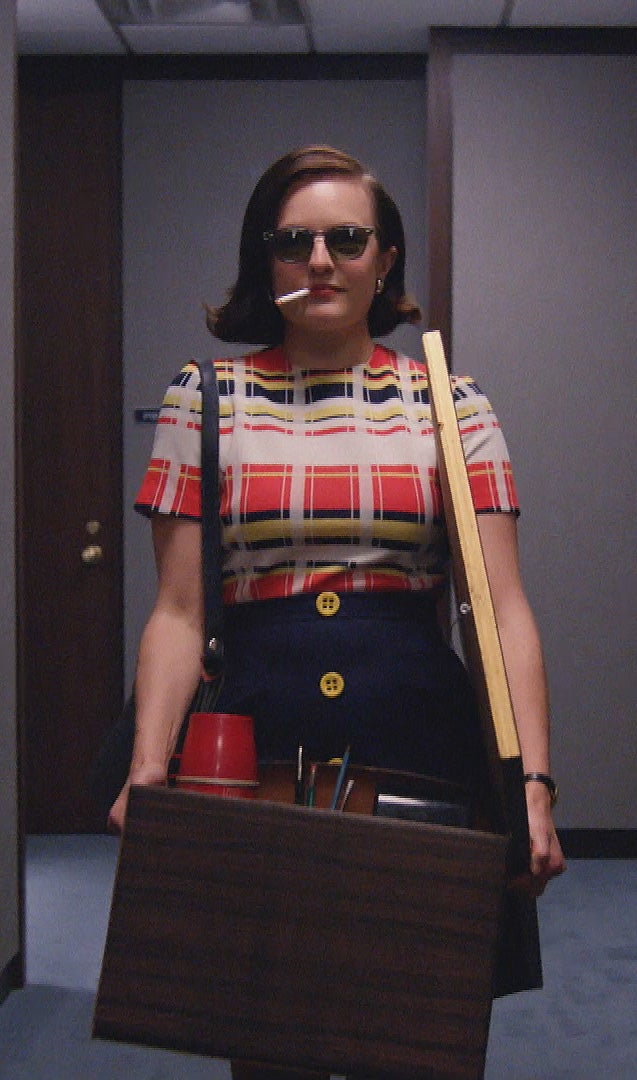Elisabeth Moss: ‘Lockdown was a breeze – I have no problem not seeing anybody’
The star of ‘Mad Men‘ and ‘The Handmaid’s Tale’ talks to Alexandra Pollard about being a loner, playing horror writer Shirley Jackson and why it’s time women stopped biting their tongues to avoid seeming bitchy


Your support helps us to tell the story
From reproductive rights to climate change to Big Tech, The Independent is on the ground when the story is developing. Whether it's investigating the financials of Elon Musk's pro-Trump PAC or producing our latest documentary, 'The A Word', which shines a light on the American women fighting for reproductive rights, we know how important it is to parse out the facts from the messaging.
At such a critical moment in US history, we need reporters on the ground. Your donation allows us to keep sending journalists to speak to both sides of the story.
The Independent is trusted by Americans across the entire political spectrum. And unlike many other quality news outlets, we choose not to lock Americans out of our reporting and analysis with paywalls. We believe quality journalism should be available to everyone, paid for by those who can afford it.
Your support makes all the difference.A few years ago, a journalist observed of Elisabeth Moss: “She excels at quiet, tightly wound characters who suppress their feelings.” The work she has done since seems designed to prove that statement wrong. She snorted and raged and spat blood in Her Smell (2018); she took a pair of scissors to her own face with a rictus grin in Us (2019); she stabbed and shot her way out of danger in The Invisible Man (2020). Now, we have Shirley.
In the claustrophobic chamber piece, Moss is horror novelist Shirley Jackson, a snarling, antisocial agoraphobic. She saw a lot of herself in the writer. “I’m very much a loner,” says the 38-year-old brightly, between sips of a pale-green smoothie. “Lockdown for me was kind of a breeze because I have no problem staying at home for long, long periods of time, and I have no problem not seeing anybody. And I also bury myself in my work.”
Moss is speaking over Zoom from her home in New York. The actor – who’s been dubbed the “Queen of Peak TV” by New York Magazine – has said that she stores her awards on her bookshelves, but there’s no sign of her two Golden Globes (for Top of the Lake and The Handmaid’s Tale), her Emmy (also for The Handmaid’s Tale) or her Screen Actors Guild Award (for Mad Men) on the cluttered ones behind her.
Shirley is the first time in Moss’s three-decades-long career that she has played a real person – though the story takes delicious liberties with Jackson’s life. Erasing her four children and inventing an infatuation with a young married woman, it is more concerned with capturing the writer’s complex spirit than sticking to the facts. We first meet her surrounded by dust and detritus, deep in what her husband Stanley (Michael Stuhlbarg) refers to as one of her “bouts”. The arrival of new tenants Fred (Logan Lerman) and Rose Nemser (Odessa Young) – the latter of whom Shirley becomes somewhat smitten with – breathes new life into her.
Moss found the role liberating. “I think there’s a Shirley in a lot of us as women,” she says. “We tend to hesitate to say things because we don’t wanna seem bitchy and we don’t wanna seem difficult, and we bite our tongues and we have to almost speak in a different way than men do. What I loved about Shirley is that she just said exactly what was on her mind and she didn’t give a s*** if she came off as a bitch.”
In one scene, stuck at a party she no longer wants to be at, Shirley pours red wine all over the host’s sofa just for the thrill of it. “How many times have we wanted to do a similar thing?!” says Moss. “You just wanna be like, ‘F*** this party, I don’t wanna talk to this weird guy who’s speaking too close to me.’ We’ve all been there.”
If Moss sounds a little misanthropic, her demeanour is anything but. Dressed in a tie-dye jumper, with her Zoom screen name declaring her “Lizzie Moss”, she is spirited and conspiratorial, taking quick, excited breaths and speaking as if she’s on the verge of laughter. She rubbishes the idea that acting should be a gruelling artistic process. “My job is pretty great,” she says, picking up a script from beside her and shaking it at the camera. “I have these scripts that are written and I get to pretend and I get to imagine. It’s a ridiculous job and I make money at it and I feel invigorated by it. I’ve just never felt that it was a dark place, I’ve always felt that it was a light place.”
Not that the work she does could be described that way. The Handmaid’s Tale is so brutal in its depiction of a misogynistic, totalitarian society that it gave one Telegraph critic an anxiety attack. Moss was midway through filming the show’s first season when Donald Trump was elected, and suddenly the idea of women’s rights being stripped away didn’t seem so far-fetched. Just as Mad Men’s Peggy Olson had become a feminist icon – if you’ve not seen the show, you might still have seen the image of Peggy swaggering into work, sunglasses on, cigarette in mouth – so Offred became a symbol of female suffering and survival.

It hasn’t always been easy to be at the vanguard of a feminist movement. She says it was a “mistake” to claim in an onstage Q&A that the show was a human story, not a feminist one. And as a lifelong Scientologist – born in LA, the self-described “Valley girl” was raised with the religion by her musician parents – she’s had to defend herself against accusations of hypocrisy. When a fan claimed on Instagram that “Gilead and Scientology both believe that all outside sources (aka news) are wrong or evil”, Moss responded, “That’s actually not true at all about Scientology.” Her religion is one of the few things she doesn’t like to talk about in interviews. “I get the fascination,” she’s said, “but you have a right to your privacy.”

Watch Apple TV+ free for 7 days
New subscribers only. £8.99/mo. after free trial. Plan auto-renews until cancelled

Watch Apple TV+ free for 7 days
New subscribers only. £8.99/mo. after free trial. Plan auto-renews until cancelled
Today, Moss has no problem framing her work through a feminist lens. She says that this year’s The Invisible Man, the blockbuster horror about a woman, Cecilia, who escapes from her abusive partner only to be stalked by his invisible presence, was a “gigantic analogy” for abuse and gaslighting. “The invisible man could be your ex-boyfriend, ex-friend, ex-boss, whatever it is that you feel like you’re haunted by in any sort of abuse cycle,” says Moss. “That’s what we wanted it to be. That feeling of, ‘I need to overcome that, I need to fight back against this presence that won’t go away, this trauma that won’t go away.’ That was the story that we were trying to tell, while Trojan-horsing it in this horror thing.”
We never actually see the abuse that Cecilia is escaping, but we don't need to. Moss’s every flinch, yell and shudder betrays the depth of her character’s trauma. Though she is capable of capturing every nuance, she is not a single-tear-down-the-cheek kind of actor; her cries are full-body convulsions.
Countless women wrote to her after the film came out – one of the last big releases pre-pandemic, it made $134m at the box office – to say how much they related to the story. “I would have friends who I didn’t know had gone through an experience like that say to me that it was cathartic to watch,” she says. “I think we all have experiences where we feel like we were gaslit or taken advantage of or told that we were crazy for thinking or feeling something. That story of abuse is not something that has arisen in the last five years. It’s not a bandwagon anyone can jump on – it’s a tale as old as time.”
Moss feels a deep responsibility to tell the stories of women well; she’s been playing complicated female characters since she was a teenager, when she was a schizophrenic burns victim alongside Angelina Jolie and Winona Ryder in Girl, Interrupted and the president’s sparky daughter in all seven seasons of The West Wing. “Women can be wonderful and can be flawed and can be good and bad and complicated, and for me it’s just about telling the honest story,” she says. “It’s not telling a story of somebody who’s perfect or that’s a morality lesson, it’s just about telling honest stories about women. That’s my guiding principle.”
She points to her favourite line in Shirley. Stanley is questioning his wife’s fascination with a missing woman, a college student she has never even met but with whom she feels a kinship. “And she responds, ‘Don’t tell me I do not know this girl,’” says Moss. “I feel like that’s so true of so many of us. I think that we all have this common experience as women, whether it is feeling lonely or feeling like you can’t talk about something, or feeling like if you do, someone’s gonna call you crazy or hysterical or difficult. We have this common experience, and I loved that line because I loved the idea of her looking at this man and saying, ‘Don’t tell me I don’t know what this feels like. You have no idea what I feel.’”
It’s why she’s so relieved that since the #MeToo movement, women are increasingly sharing their experiences with one another. “I’ve had more conversations in the last few years than I used to have,” she says. “It’s important for us as women to be talking about it. Even if you’re in a meeting and a man cuts a woman off and starts speaking, that’s something that’s now noticed. Now you can say, in the wonderful words of Kamala Harris, ‘I’m speaking.’ It doesn’t mean that it doesn’t still happen, but there seems to be more recognition of, ‘No, you’re not actually allowed to do that.’ Which I think is good.”
Moss tries to set an example for the younger generations, too. “When I observe somebody who I’m working with who has an opinion and they speak up for it, I think it’s important to say, ‘Thank you for doing that. I hear you. That is exactly what you should be doing.’ It’s OK to have an opinion. It’s OK to say it.” She grins. “Nobody’s gonna think you’re a bitch.”
Shirley is out on Curzon Home Cinema now


Join our commenting forum
Join thought-provoking conversations, follow other Independent readers and see their replies
Comments